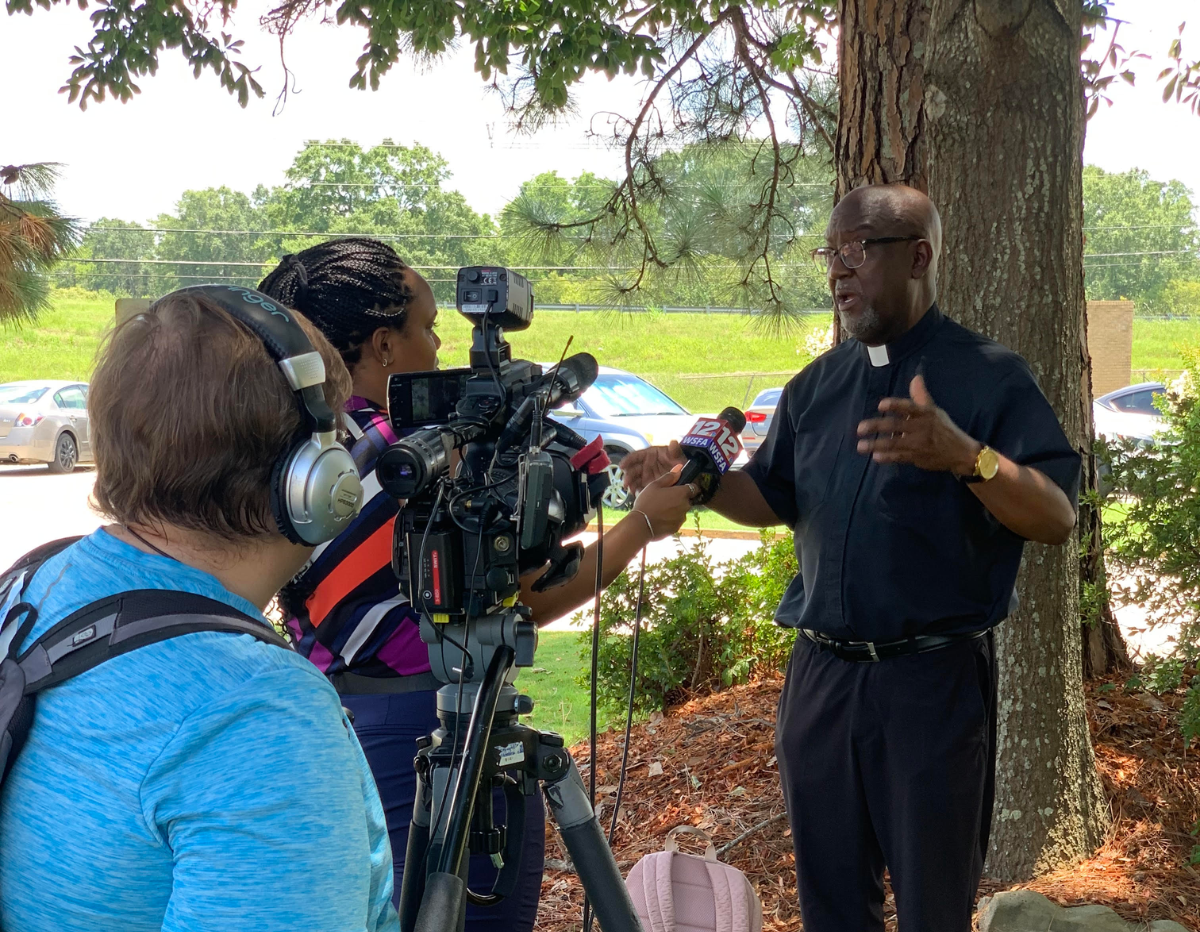
I was at the train station in Charlottesville talking to two women about our mutual appreciation for the musical Jesus Christ Superstar, which they would see in DC. They shared about their work as librarians. I shared about Equal Justice USA and our desire for every community to be safe and healthy, where violence is rare and well-being dominates.
Then I gave them my card, which reads “Sam Heath, Manager, EJUSA Evangelical Network.” They looked up, confused. “Evangelical?” they said. “But I thought you said you cared about justice?”
My heart sank.
I sighed, knowing that the 500-year-old word “evangelical,” based on the much older Greek word evangelion – which simply means the good news of Jesus – triggers many things to many people. In the popular imagination, evangelicalism has gone from a theological movement about being “born again” to a socio-cultural one to something vaguely political and, ultimately, highly partisan. Over time, evangelicalsim became synonymous with conservatism and, increasingly today, Christian nationalism.
I even wrote a page on our website answering, “What do we mean by ‘evangelical’?” because I often get asked that.
Despite these challenges, I see incredibly encouraging ways evangelicalism is moving, growing, and settling. I’ve gravitated toward the idea that, at least since COVID, evangelicalism has been sifted and sorted (as opposed to fractured), and people are landing in unexpected places. People increasingly see the truth of Psalm 89, that since justice is part of the foundation of God’s throne, it should be at the center of our life together, both in the public and private spheres.
I want to highlight three stories – one national, one state-specific, and one local – where the Evangelical Network has been fortunate to be a part of places and spaces where Christians are eschewing tribalism and embracing proximity to our neighbors.
National
Andre Thomas is on death row in Texas for three murders that occurred 2004, and his life story is one of abuse, mental illness, and tragedy. Faith leaders across the country signed a letter to Governor Abbott, requesting clemency for Mr. Thomas. Perhaps most notable among the signatories was Walter Kim, president of the National Association of Evangelicals.
The letter states that Andre Thomas is “indisputably one of the most severely mentally ill incarcerated individuals in Texas history.”
The NAE has a resolution from 2015 that is cautious in its position on the death penalty, registering concern without voicing a full opposition.
The NAE’s support, along with many other faith leaders, advocates, and attorneys, resulted this April in a trial court judge withdrawing Andre Thomas’ execution date to give more time to demonstrate that Mr. Thomas’ degree of mental illness would make his execution unconstitutional. We pray Andre Thomas’ life will ultimately be spared.
State
In 2001, James “Jimi” Barber murdered Dorothy Epps in Alabama. Jimi – and I use his first name since I was privileged to correspond with him before he died – became a Christian, forced his prison to allow his baptism, and grew in his faith. Sarah Gregory, the granddaughter of the victim, who had nursed a hatred against Jimi for two decades, grew to a place where she was ready to forgive him through a letter.
The EJUSA Evangelical Network helps facilitate a monthly multi-faith group called the Alabama People of Faith Death Penalty Coalition, which works to support state organizations seeking an end to the death penalty in Alabama. In one of the coalition’s meetings, Sarah Gregory shared her testimony about her years of friendship with Jimi, saying she had to learn to “walk through my fear” in engaging Jimi. She did just that to the end.
Jimi was executed by the state of Alabama on July 21, despite faith leaders aggressively and publically calling for his commutation. Sarah Gregory witnessed the execution, which followed a rich time of praying and singing that Jimi organized. She has since shared her story nationwide and joined the Advisory Board for Alabama’s Project Hope to Abolish the Death Penalty, our country’s only death penalty group formed and run by individuals on death row.
Local
Lastly, a very localized group in North Carolina shows how even proximity to the criminal legal system does not automatically cultivate a posture of compassion. Similar to my story, this heart change can take years.
Pharaoh’s Daughter is a group in Raleigh, NC, that helps incarcerated and formerly incarcerated mothers access wraparound services that especially center their children. Susan Henson is the executive director, and she recently came to an EJUSA Evangelical Network In the Movement webinar about restorative justice.
We met one-on-one afterward, where Susan shared with me that even though her daughter was incarcerated years ago. Despite Susan working with women who have been incarcerated, she was very opposed to the idea of restorative justice when she watched the webinar.
But then she said she felt her mind turned and, by the end of the time, was enthusiastically supportive of a restorative approach following harm, violence, or crime. She said, “We can’t law people back; we love people back.”
Friends, across the country, hearts are changing; evangelicals are seeing that our criminal legal system’s response of punishment is fear-based, and Christians are given the Bible’s most oft-repeated command – “Do not fear.”
Yes, evangelicalism is sorting itself, but we are often seeing that people are settling into a place where they have a sense of justice being something other than punishment, something that instead includes at least a measure of healing for all parties – those who were harmed, those who harmed, and the surrounding community. This counter narrative of hope and healing is robustly biblical (and true) enough to combat the tribalism and stereotypes that permeate our civic discourse.
Evangelicalism still can be and is good news.



